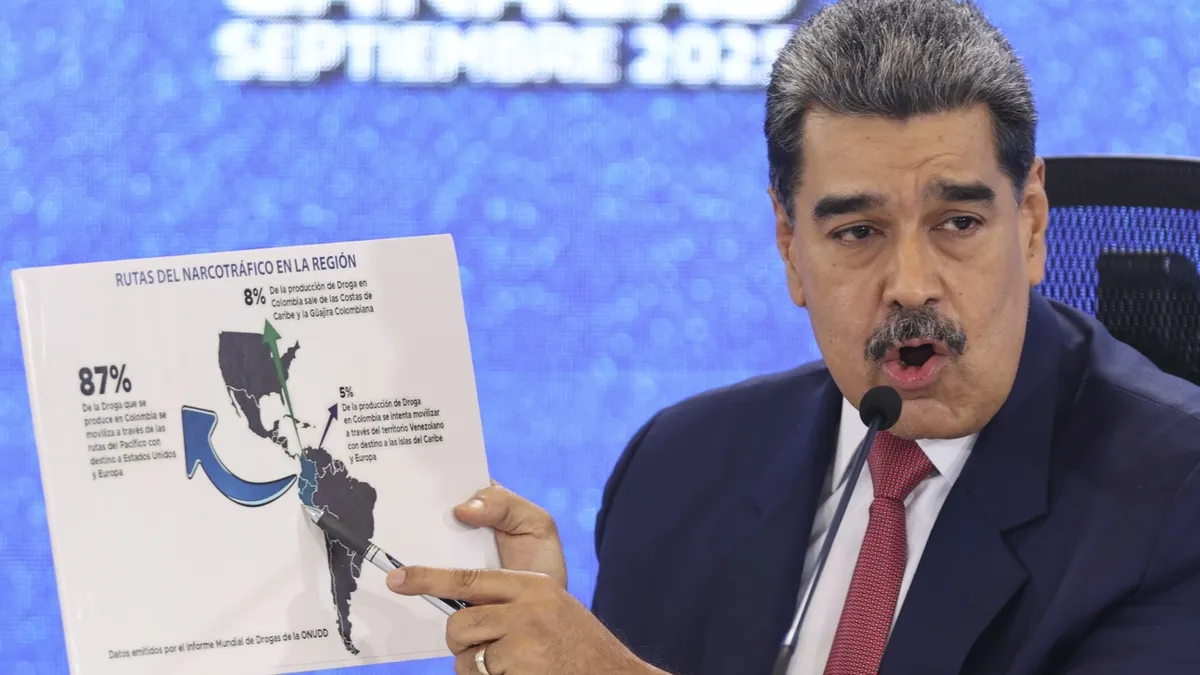
President Donald Trump announced on Monday that the U.S. military has once again engaged a vessel allegedly involved in drug trafficking from Venezuela, resulting in the deaths of three individuals aboard. This military strike reflects the administration's ongoing commitment to combatting narcoterrorism and could signify an expansion of military efforts against drug cartels operating in international waters.
The operation occurred in international waters, targeting confirmed narcoterrorists from Venezuela who were transporting illegal narcotics — described by Trump as a "deadly weapon poisoning Americans" — destined for the United States. In a post on Truth Social, Trump emphasized the extreme violence associated with these drug trafficking cartels, stating that they pose a significant threat to U.S. national security, foreign policy, and vital American interests.
This strike follows a similar military action nearly two weeks prior, which resulted in the destruction of a drug-carrying speedboat from Venezuela and the death of 11 individuals. Trump later addressed reporters in the Oval Office, where he claimed to have seen footage of the latest operation provided by General Dan Caine, the chairman of the Joint Chiefs of Staff. When questioned about the evidence supporting the claim that the vessel was carrying drugs, Trump responded, "We have proof. All you have to do is look at the cargo that was spattered all over the ocean — big bags of cocaine and fentanyl all over the place."
During his remarks, Trump hinted at the possibility of expanding military strikes against drug smugglers operating on land, alongside the ongoing naval operations. He indicated that the U.S. military has observed a reduction in the number of vessels in the Caribbean since the initiation of aerial strikes this month. However, he acknowledged that drug cartels continue to smuggle narcotics overland, stating, "We're telling the cartels right now we're going to be stopping them, too."
Defense Secretary Pete Hegseth later echoed Trump’s sentiments on social media, warning that the U.S. would track, kill, and dismantle cartel networks throughout the hemisphere, employing assertive language reminiscent of prior administrations during the Global War on Terror.
The legality of these military actions has come under scrutiny from several senators, including both Democrats and some Republicans. They express concerns that Trump's military operations may represent an overreach of executive authority, particularly as the military is being utilized for law enforcement purposes. Democratic Senator Adam Schiff of California is drafting a war powers resolution aimed at preventing further military actions without congressional approval, voicing worries that these "lawless killings" could provoke retaliatory actions against U.S. forces.
Human rights organizations have also raised alarms regarding potential violations of international law. Daphne Eviatar, who directs Amnesty International USA's Security with Human Rights Program, stated, "This may be an extrajudicial execution, which is murder. There is absolutely no legal justification for this military strike."
The Trump administration has framed its military actions as necessary self-defense, alleging that Venezuelan drug cartels represent an immediate threat to the United States. U.S. officials confirmed that the previous strike targeted Tren de Aragua, a Venezuelan gang designated as a terrorist organization by the U.S. However, it remains unclear whether Tren de Aragua was also the target of the latest strike.
In response, Venezuelan President Nicolás Maduro condemned the U.S. government, suggesting that the military operations are a guise for intimidation and regime change. He criticized the U.S. for conducting military actions based on drug trafficking accusations, questioning the rationale behind deploying armed Marines to raid fishing vessels. Maduro argued, "What were they looking for? Tuna? A kilo of snapper?"
Senator Marco Rubio, a vocal critic of Maduro, reiterated the U.S. position that the Venezuelan government operates like a drug cartel. He stated, "We're not going to have a cartel, operating or masquerading as a government, operating in our own hemisphere." Following the initial military strike, U.S. diplomats emphasized that the Trump administration would utilize military force and all elements of American power to target cartels threatening America.
As discussions about the legality and ethics of these military actions continue, the Trump administration appears poised to escalate its operations against drug trafficking in Venezuela, raising questions about the potential ramifications for U.S.-Venezuela relations and international law.